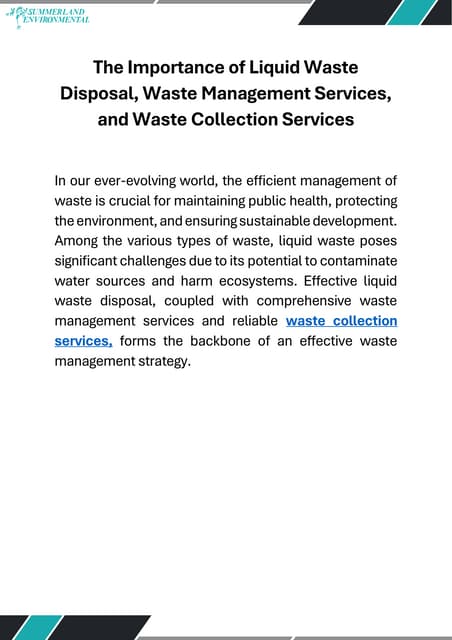What Does Reclaim Waste Do?
What Does Reclaim Waste Do?
Blog Article
A Biased View of Reclaim Waste
Table of ContentsReclaim Waste Things To Know Before You Get ThisThe smart Trick of Reclaim Waste That Nobody is DiscussingExamine This Report on Reclaim WasteReclaim Waste Can Be Fun For AnyoneAn Unbiased View of Reclaim Waste
Domestic sewer waste refers to the waste and products from a property septic tank. The appropriate monitoring and disposal of domestic sewer waste require fluid waste to be transferred to a sewer treatment plant where the correct methods and tools are applied to cleanse and dispose of waste.
Commercial waste usually includes prospective hazards, such as combustible products or a mix of liquid and solid waste items, and calls for an advanced and detailed disposal process. The disposal of business waste generally includes the purification of waste before transportation to make sure safe and appropriate disposal. Hazardous waste is developed from byproducts and runoff of industrial procedures and production.
This type of waste can not make use of the very same sewage administration transportation or processes as septic or business fluids. The commercial waste monitoring process requires the assessment and screening of fluid waste before it undergoes the disposal process (liquid waste disposal melbourne). Runoff waste is the fluid waste that comes from overflow and excess stormwater in highly inhabited areas or cities
Overflow waste can cause contamination and flooding if not managed effectively. Discover more concerning sewage system cleaning and waste administration. Making sure proper waste management can prevent catastrophes and decrease environmental harm. Both people in residential settings and specialists in commercial or production sectors can profit from recognizing the processes and laws of fluid waste monitoring.
The Definitive Guide for Reclaim Waste
Call PROS Services today to find out about our waste management and disposal services and the correct ways to care for the liquid waste you create.
(https://share.evernote.com/note/7e2c20e2-4e08-1523-1aa2-d06cf7e27761)This so-called 'wastewater' is not only a crucial resource yet, after therapy, will certainly be released to our land, waterways or the sea. Utilized water from commodes, showers, baths, kitchen sinks, washings and commercial procedures is known as wastewater.

water made use of to cool equipment or tidy plant and equipment). Stormwater, a type of wastewater, is runoff that flows from farming and city areas such as roofings, parks, gardens, roads, courses and seamless gutters into stormwater drains pipes, after rain. Stormwater streams without treatment straight to local creeks or rivers, ultimately getting to the ocean.
Some Known Details About Reclaim Waste
In Queensland, many wastewater is treated at sewage treatment plants. Wastewater is transported from domestic or commercial sites with a system of drains and pump stations, referred to as sewerage reticulation, to a sewage treatment plant. Regional governments build, maintain and operate most sewer therapy plants. Operators are accredited under the Environmental Management Act 1994 to discharge treated wastewater at an appropriate ecological criterion right into rivers.
The Division of Natural Resources encourages regional governments about managing, operating and keeping sewerage systems and therapy plants. In unsewered areas, neighborhood governments may need householders to install specific or house sewer treatment systems to treat domestic wastewater from commodes, kitchens, washrooms and washings. The Division of Natural Resources authorises making use of home systems when they are proven to be reliable.
The majority of stormwater obtains no treatment. In some brand-new class, treatment of some stormwater to get rid of trash, sand and gravel has actually started using gross pollutant catches. Wastewater treatment occurs in 4 phases: Gets rid of strong issue. Bigger solids, such as plastics and various other items wrongly discharged to sewage systems, are gotten rid of when wastewater is travelled through screens.
Makes use of small living microorganisms recognizes as micro-organisms to break down and get rid of continuing to be liquified wastes and great particles. Micro-organisms and wastes are integrated in the sludge.
The smart Trick of Reclaim Waste That Nobody is Discussing
Nutrient elimination is not available whatsoever sewage treatment plants because it needs expensive specialized tools. It is becoming more typical in Queensland. Clear liquid effluent produced after treatment may still include disease-causing micro-organisms. If this effluent is released into rivers such as rivers or the sea, the micro-organisms will ultimately pass away out.

This generally suggests wastewater has actually to be treated or pollutants removed prior to it can be released to waterways. The majority of wastewater streams into the sewage system. Under the Act, local federal governments carry out authorizations and licences for eco pertinent activities (Periods) entailing wastewater launches that might have a neighborhood effect. The division provides approvals and licences to ERAs including wastewater releases that may have a regional or statewide effect.
8 Simple Techniques For Reclaim Waste
Or else, samples are taken for lab analysis. Commonly numerous tests are needed to establish the degrees of each of the various contaminants such as oils, hefty metals and pesticides in water. Tracking provides valid information regarding water high quality and can verify that permit problems are being fulfilled. The info acquired with surveillance gives the basis for making water high quality choices.
Report this page